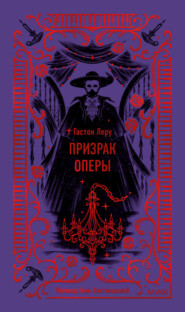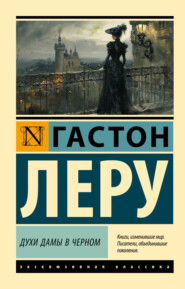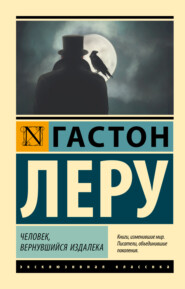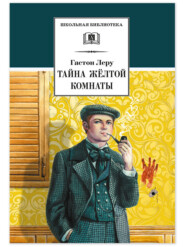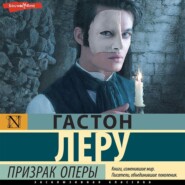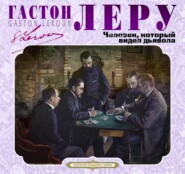По всем вопросам обращайтесь на: info@litportal.ru
(©) 2003-2024.
✖
The Bride of the Sun
Автор
Год написания книги
2018
Настройки чтения
Размер шрифта
Высота строк
Поля
“But you do not admit outsiders? What a pity.... I should so like to see.... One hears so many things....”
“Old wives’ tales, señorita,” rejoined the Indian, with a complete change of manner. He smiled, disclosing a line of teeth which Dick mentally compared to those of a wild animal, and added in a slightly lisping voice: “There is a lot of nonsense talked.... Human sacrifices, and so forth.... Do I look as if I were going to such a ceremony?… I and my clothes by Zarate?… No, señorita, just a few little ceremonies to keep alive the memory of our lost glories… a few pious invocations to the God of Day, a few prayers for poor Atahualpa, our last King, and that is all.... At the end of the month, señorita, I shall be back at my bank in Lima.”
Reassured by the matter-of-fact level reached by these words, Dick growled at his own absurd fears. A smile from Maria-Teresa and a grumbled comment on kings and bank clerks from Uncle Francis completely dispelled the cloud raised by the mention of the Interaymi.
Their train was now traveling along the bed of a ravine, closed in by dizzying heights. High up above, in a band of blazing blue sky, giant condors could be seen winging their way in heavy circles.
“To think of Pizarro facing country like this!” exclaimed Dick. “How on earth was it that they were not simply wiped out by the Incas?”
“They came as friends, señor,” answered the Indian.
“That is all very fine, but still does not explain it How many men were there with Pizarro when he marched on Cajamarca?”
“He had received reenforcements,” interjected the Marquis, twisting his mustache, “and there were then a hundred and seventy-seven of them.”
“Minus nine,” corrected the Indian.
“That is, unless I am mistaken, only a hundred and sixty-eight,” put in Uncle Francis, busy with his note-book.
“Why minus nine?” questioned Maria-Teresa.
“Because, señorita,” replied the descendant of Mama-Buntu, who seemed to know the history of the conquest of New Spain better than the descendants of the conquerors themselves, “because Pizarro gave his new followers the same chance to draw back that the others had received. He had halted in the mountains to rest his band and make a careful inspection. As you have said, señor, they were then only a hundred and seventy-seven, including sixty-seven horse. There were only three arquebusiers, and a few crossbowmen—not more than twenty altogether. And with this band Pizarro was marching against an army of 50,000 men and against a nation of twenty millions! For, under the Incas, Peru included what are to-day called Peru, Ecuador, Bolivia and Chili. At this point, señores, he decided that his soldiers were still too many. He had noticed that some faces were dissatisfied, and, fearing that the discontent might spread, he decided to cut away the weak limbs before the gangrene reached the main body. Marshalling his men, he told them that they had reached a crisis in their fortunes—not a man must go on who doubted its ultimate success/ It was still not too late for waverers to return to San Miguel, where he had already left some of his companions. He was prepared to risk all with those who still wished to follow him. Nine men took advantage of Pizarro’s offer—four infantrymen and five from the cavalry. The others stopped with their general.”
“And cheered him to the echo at the call of Christobal de la Torre, who served the Conquistador like a brother!” exclaimed the Marquis.
“We know, we know!” repeated the clerk. His tone roused the Marquis again.
“And might I ask why you are pleased to recall all these things?” demanded Don Christobal haughtily.
“To prove to you, señor, that the vanquished know the history of their country even better than the conquerors,” retorted Runtu with an emphasis not a little ridiculous in a man of his dress and calling.
“Look! How beautiful!” exclaimed Maria-Teresa, anxious to divert their attention to the landscape.
Their train was passing over a bridge from which a panorama of unparalleled beauty could be obtained. Before them stretched the giant chain of the Andes, peak heaped on peak. On one side, a rent in the ridges opened onto green forests, broken by little cultivated plateaus, each with its rustic cottage clinging to the rugged mountain-side And there, above, snowy crests sparkling in the sun—a chaos of savage magnificence and serene beauty to be found in no other mountain landscape of the world.
It was almost more terrible than beautiful, and as the train crossed abyss after abyss over quivering bridges, Maria-Teresa, clinging to Dick’s arm, could not help murmuring: “And even this did not daunt Pizarro.”
Unfortunately, she was overheard by the stranger, who took up the broken conversation with evident hostility:
“We could have crushed them easily, could we not?”
The Marquis, turning superciliously, flicked the questioner’s shoulder with his glove:
“And, pray, why did you not do so, then?”
“Because we, sir, were not traitors!”
Dick had only just time to stop the Marquis, who was on the point of rushing at the insolent Indian. Maria-Teresa, knowing her father’s pride, calmed him in a moment by urging in an undertone that it would be ridiculous for a man of his rank and age to pay more attention to an Indian bank-clerk.
“You are quite right,” said Don Christobal with a gesture of contempt under which the Indian stood motionless as a statue. He had not been without guessing the sense of Maria-Teresa’s remarks, and might have said more had not the stopping of the train definitely closed the incident.
The railway line, then still in course of construction, went no farther. The remaining thirty miles to Cajamarca had to be covered on mule-back, for they were still in the heart of the mountains, and the defiles were steep.
It was too long a journey, however, for the tired travelers to undertake until the following morning. Clinging to the flanks of the rocks were a few rude sheds in which were lodged the men working on the line. Near by, surrounding a canteen, stood a dozen fairly comfortable tents, in which they themselves were to pass the night In a meager pasture just beyond, some thirty mules wandered at liberty, grazing. Above, the omnipresent galinagas flew in circles against a purple sky.
Dinner, served on the brink of a chasm from which rose the mutter of the racing stream, was a gay meal. Buntu had vanished, and did not reappear until after nightfall, when Maria-Teresa met him near her tent. He was very apologetic, and, hat in hand, excused himself for the incident in the train. He had had no intention of being rude, and knowing that the Marquis was a great friend of the manager of the Franco-Belgian bank, he hoped that he would not carry the matter further.
Maria-Teresa, conquering a strong desire to laugh, promised the descendant of the Incas that he would not lose his clerkship through them. When he had bowed himself out of sight, she carried the story to her father and Dick, who were vastly amused. Then they all went to bed, with the exception of Uncle Francis, who passed the greater part of the night putting his notes in order and writing an article for a reverend monthly in which he re-told the story of the conquest of Peru, with the aid of the Last of the Incas. This Indian he sketched as a gloriously picturesque character, carefully omitting to say that he wore European clothes!
As every night since the appearance of the three strange heads on her balcony Maria-Teresa found sleep with difficulty. To-night, though tired by the journey, she tossed restlessly on her narrow camp-bed. Suddenly, in the dead of night, she sat up, listening. A familiar voice seemed to be speaking. She slipped noiselessly to the canvas flap covering the entrance to the tent, and peeped out.
There were two shadows out there, moving away in the moonlight One she recognized immediately for the Indian bank-clerk. Who was the other? They stopped, and half turned toward the tent. It was Huascar!
What was Huascar doing there, at that time of night, with that strange Indian? Why were they pointing at her tent? What did it all mean?… The two shadows were walking again.... Then the peace of the night was broken by a neigh, and the young girl saw a picketed horse stamping in the shadow beyond. Huascar vaulted into the saddle, while his companion loosed the picket-rope, still talking and occasionally nodding toward the tent. Then both disappeared, and silence descended again on the sleeping camp.
Maria-Teresa could not sleep all night. Huascar’s unexpected reappearance was in no way calculated to calm the half-expressed terror which haunted her, and which she refused to acknowledge, stifling what she called her cowardice.
Had she anything to fear from Huascar? She could not believe it. She knew quite well that the Indian loved her, but as a faithful dog does, she thought; and she felt certain that she could count on his devotion were she in any danger.
And yet! And yet!… And yet what? What danger could there be? It was too absurd! She was becoming as ridiculous as those two old ladies with their crazy legends! With that, she decided not to say a word to either Dick or her father. She was not going to be taken for a child afraid of every shadow it saw at night. But she would question Huayna Gapac Runtu on the very first occasion.
This occasion presented itself during the first stage of the next day’s journey. Maria-Teresa, the Marquis, Dick and old Montgomery led the way. Uncle Francis, at first delighted with the prospect of a mule-ride, soon determined to get off again. Riding along the very edge of precipices, his mount felt ten times too high, and he was sure that he would be safer on foot and, at certain times, on all-fours. He gradually became convinced that his mule would slip, and determined to dismount, at a point where two riders could not pass abreast.
The whole cavalcade was thus stopped, while those behind called on the scientist to go ahead, and he vowed that he would do nothing of the kind, twisting in his saddle and trying to discover the best way to get off. Immediate action of the Indian bank-clerk saved the situation, and probably Uncle Francis’ neck. Getting off his own mule, Runtu squeezed down the line, and catching Mr. Montgomery’s mount by the bridle, led it on to a broader path and safety. Dick, the Marquis and Maria-Teresa could not do less than thank him.
When they moved on, Maria-Teresa and the Indian were riding side by side.
“Well, señor Huayna Capae Runtu?” she smiled at him.
“Oh, señorita, let us forget all those illustrious names, which died with my ancestors. The only one I have a right to now is that by which I am known at the bank—just plain Oviedo, like everybody else.”
“Yes, I remember now. That is what you called yourself when you came to me from the bank.... Well, señor Oviedo, can you tell me now what you were doing outside my tent last night with Huascar, my former servant?”
Oviedo Huayna Capac Runtu did not budge, but his mule swerved slightly. He reined it in.
“So you saw Huascar, señorita? An old friend of mine. He arrived late at night, on his way to Cajamarca, and knowing I was at the camp, halted here a minute to see me. I remember now, we did stop outside your tents. When I told him you were there, he asked me to keep watch over you.... He went on immediately afterwards.”
“Do I need somebody to keep watch over me, then? Am I in any danger?”
“The ordinary dangers of a journey like this. A mule may miss its footing, or a saddle may slip off. In either case, it spells death. That is what Huascar meant, and that is why I myself chose your mule and girthed it up this morning.”
“You are too kind,” said Maria-Teresa drily.
At this moment, Uncle Francis drew level with them. He had recovered his equanimity with the wider path, and spoke casually of mountain dangers.
“All the same,” he added, “I wonder how Pizarro managed to bring his little army through here.”
Maria-Teresa threw him a look which, had he seen it, would have toppled the clumsy scientist into a ravine, mule and all. But he remained serenely unconscious.







